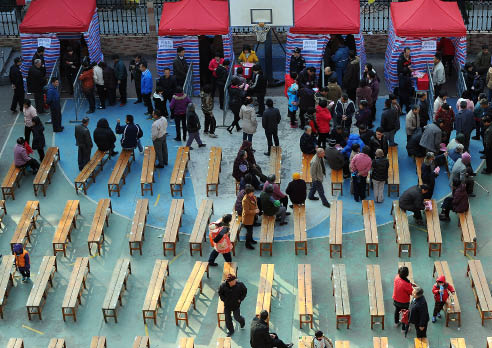Hard and Fast on the Path of Reform
- By Hou Ruili
 0 Comment(s)
0 Comment(s) Print
Print E-mail China Today, February 26, 2014
E-mail China Today, February 26, 2014
| Residents of Dabu Village in Dongguan, Guangdong Province, cast their ballots on December 29, 2013 at villagers committee elections. |
Evolution of China's Grassroots Democracy
In 1986, after hearing their villagers committee's work report, more than 80 percent of residents of Beilaohao Village, Lishu County in Jilin Province, birthplace of notorious Qing Dowager Empress Cixi (1835-1908), demanded the right to directly elect villagers committee members. They believed the incompetency of village leaders had failed to lift the village out of poverty. Until then, elections had been mere formalities in villages, as villagers merely voted for candidates that higher authorities had nominated. "The county government agreed to an election," then deputy county magistrate Fei Yuncheng recalled, "No one imagined it would set a precedent for grassroots election in China."
The new election mode, whereby the electorate directly nominates villagers committee candidates, has been promoted throughout China's countryside. The year 1988 saw publication of the Organic Law of the Villagers Committees, which provides that "Villagers on the electoral register should directly nominate candidates in villagers committee elections." Since then, general elections have become the legal norm in village-level governance. "Direct election is an important indication of rural democratic political reform," former director of the Civil Affairs Bureau of Lishu County Xu Qian said. "It constitutes restoration of farmers' democratic rights, and hence a major innovation of Chinese farmers under the leadership of the Communist Party of China."
A U.S.-based research organization lists China's method of election among the world's six democratic election modes. As of now, 95 percent or more of China's villages elect villagers committee members, thus paving their way to democratic self-governance.
Urban communities also practice democratic management. The publication in 1989 of the Organic Law of the Urban Residents Committees of the People's Republic of China clarified the function of neighborhood committees in achieving urban community autonomy. Nowadays most urban communities directly – as in the relatively affluent southeast coastal areas – or indirectly elect residents committees. In a direct election, residents whose names are on the electoral register may elect committee members by secret ballot. Some communities have also established resident representative assemblies. Selected from different resident groups the assemblies, along with committees, speak on residents' behalf and give consultations on community matters.
Workers' conferences are a fundamental form of democratic management in many companies and institutions. China promulgated the Company Law and the Labor Law in 1994, and the Trade Union Law in 2001. These three laws gave rise to corresponding regulations with regards to workers' conferences, effectively transforming them into coordinating systems between the nation, enterprises and workers that guarantee workers' democratic rights. Today, 94.34 percent of companies and institutions of public ownership with labor unions have established the system of workers' conferences. Only 10 percent of private and foreign companies in China that have labor unions, however, have instituted this system.
Professor Wang Changjiang of the Party School of the Central Committee of the CPC and member of the National Committee of the CPPCC (Chinese People's Political Consultative Conference) believes that bestowing authority through elections is the source of democracy and denotes the onset of public power. Without sufficient authorized democracy, other manifestations of the democratic principle are nullified.







Go to Forum >>0 Comment(s)